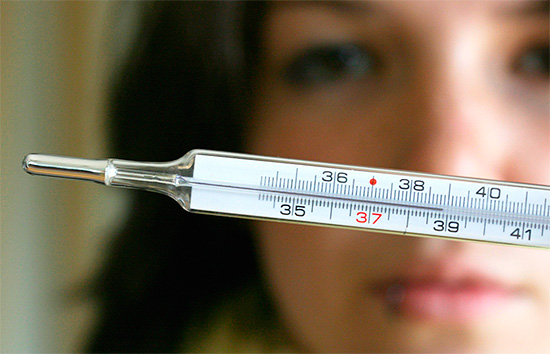
No matter how hard the dentist-surgeon gently removes your tooth, however, forcibly removing it from the hole always involves trauma to the surrounding tissues and the formation of a bleeding wound in the mouth. In response to the injury, the body of a healthy person almost always responds with a corresponding inflammatory process with characteristic signs, which include pain, redness, swelling and fever. That is why the temperature after the removal of the tooth is considered, generally speaking, a normal phenomenon, but only as long as it meets certain criteria, which we will discuss a little later.
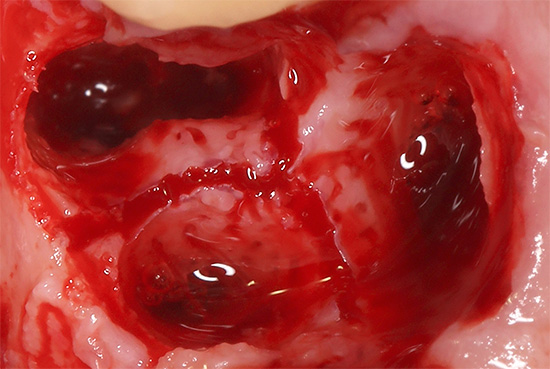
On a note
Studies have shown that there is some correlation between the rise in temperature immediately after tooth extraction and the patient’s emotional state during the procedure. A strong fear of surgery and emotional shock create additional prerequisites for improvement.temperature for some time after tooth extraction.
The temperature can rise after the removal of any tooth: incisor, canine, wisdom tooth, etc. However, one should not panic right away, since it’s not so much the fact of temperature increase that is important as its time dynamics and associated symptoms (and, of course, the meaning itself).
It should be understood that the increase in temperature is only an indicator of certain disorders in the body, the tip of the iceberg, reflecting the intense work of the immune system.
Why does the temperature rise after tooth extraction?
A dentist-surgeon resorts to the removal of a diseased tooth only when it is already impossible to save it for some reason. And the very first in the list of indications for tooth extraction is a disease under the general name “exacerbation of chronic periodontitis,” although sometimes you can try to save a tooth even in such a difficult case.
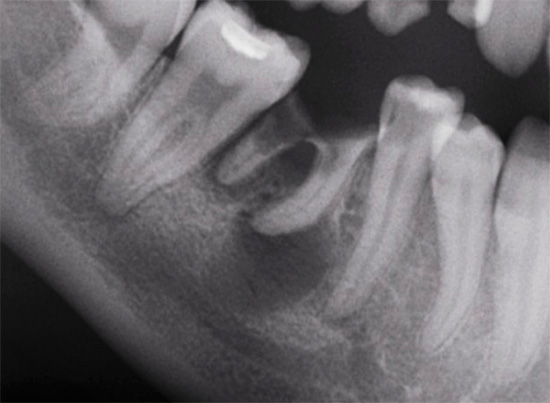
Against the background of exacerbation of periodontitis, the situation with the tooth is really depressing:
- in the carious cavity there are softened and pigmented carious tissues;
- inside the root canals, the inflamed pulp (“nerve”) disintegrates (actually decays);
- around the tops of the roots of the tooth there is a varying degree of pronounced rarefaction of the bone tissue - in the picture it reads like dark spots, lines, teeth, etc.
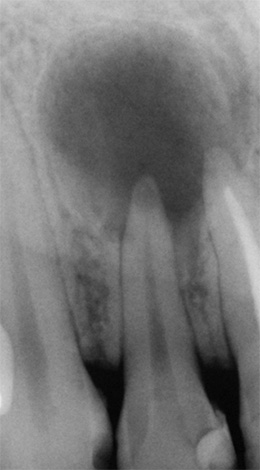
In such a situation, there is a high risk of leaving the infection process in the well even after removing all the roots with cysts from it.
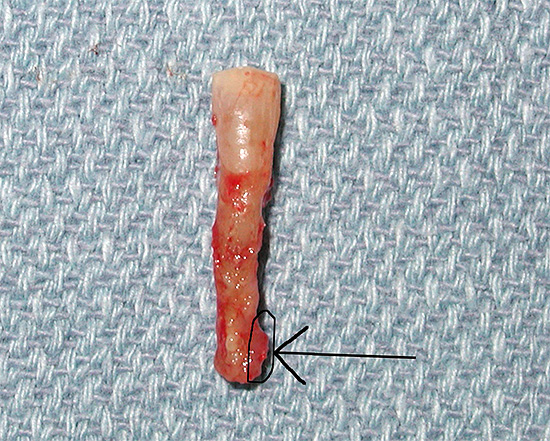
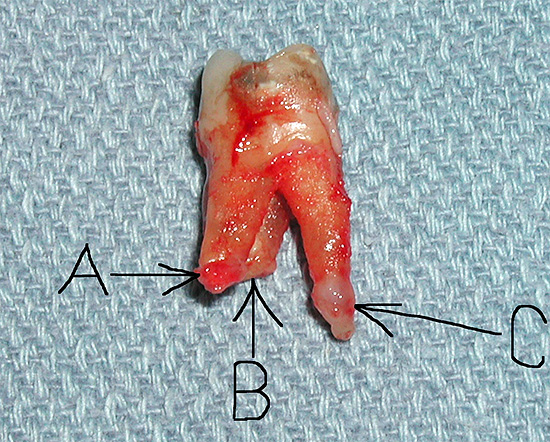
In practice, even taking into account the washing of the wound with an effective antiseptic solution, it is impossible to completely eliminate the bacterial flora after tooth extraction, therefore the patient subsequently has a natural temperature rise as a result of combating immunity with infection in the wound. Usually in such cases, the temperature does not rise above 37.5 degrees, indicating a calm healing of damaged tissues.
The more damage the dentist-surgeon caused to the surrounding tissues when the tooth was removed, the higher the risk of the temperature rising to high values. Most often this happens on the very first day of removal, in the late afternoon or at night: the temperature on the background of pain, swelling of the gums and cheeks can rise after the removal of a tooth to 38-39 degrees.
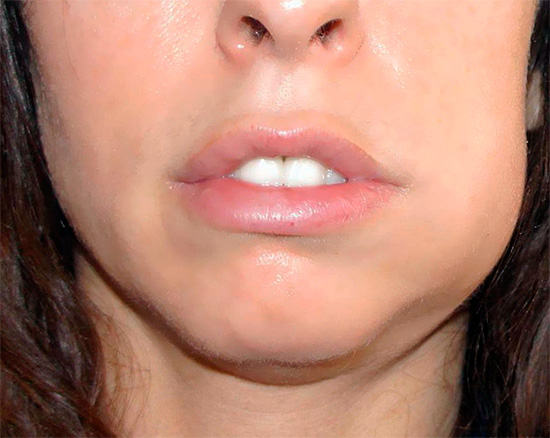
However, do not be afraid and think that something incredible is happening. Often, in the morning, the temperature, pain and swelling of their own pass.Towards evening (that is, a day after the tooth is removed), the temperature often rises again, but, as a rule, it is no longer than 38 degrees.
Feedback:
“I went to the local polyclinic in my city, I had to pull out the lower wisdom tooth, which had long been sick, sometimes unbearable. He came early in the morning, and after 20 minutes he was already sitting in a chair with his mouth open and waiting for the verdict. The surgeon confirmed my assumption that the tooth should be removed. Long time ago, I’ll tell you, they didn’t beat a tooth like that, they tortured me for about an hour, they turned everything around.
In the evening I already felt bad, my head ached, I started to shiver. The temperature of 37.8, and by the night rose to 38.8, I had to shoot down. In the morning the first thing went to the same doctor for an explanation. It turned out that I had only inflammation, so the doctor made some lotions, prescribed pills and let him go home for treatment. By evening, another 37.4 was, but then everything was gone ... "
Gregory, Moscow
Dangerous complications leading to fever
In some cases, the temperature after tooth extraction may rise against the background of rather dangerous complications,incurred as a result of improper removal or the fault of the patient. Let's look at examples of such situations.
Not removed tooth root or part thereof
A significant increase in the inflammatory reaction in the gum may occur due to a medical error made at the stage of tooth extraction when a root or part of it remains in the hole. But even in this case, sometimes it does not cause immediate serious consequences, since the immune system can cope with this by creating a formation around the top of the left root called granuloma, which is gradually transformed into a cytogranuloma, and then into a cyst.
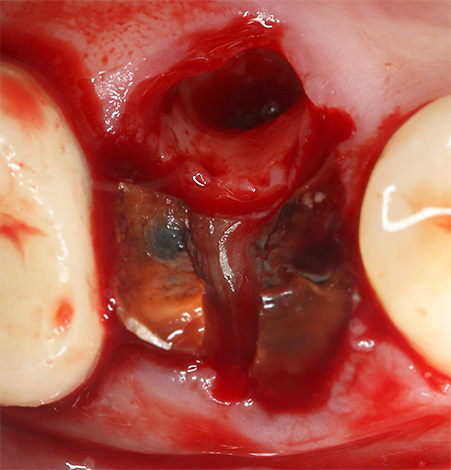
It is interesting
As a result of the growth of granulations around the circumference of the root left by the dentist, a fibrous capsule is gradually formed - a granuloma, which initially does not have a cavity. Gradually, the granuloma grows and takes on a rounded flat shape. Growth is carried out by resorption (dissolution) of bone tissue.
Increased bacterial activity creates the prerequisites for the formation of a cavity inside the granuloma. Thus, the stage of granuloma passes into the abdominal formation - cystogranuloma, and then into the cyst.The cyst cavity is usually filled with decay products of protein and fatty tissues.
If in the future for any reason (ARVI, sinusitis, periodontitis, mechanical trauma of the tooth, etc.) the integrity of the cyst on the root left in the gum will be broken, it can lead to serious consequences - an increase in temperature to high values (38-39 ° С ), swelling of the gums and cheeks, pain, general deterioration of health. Negative dynamics can persist for several days, but one should not wait so long: at the first signs of an unfavorable dynamic situation with a continuous deterioration of the general condition, one should immediately consult a doctor.
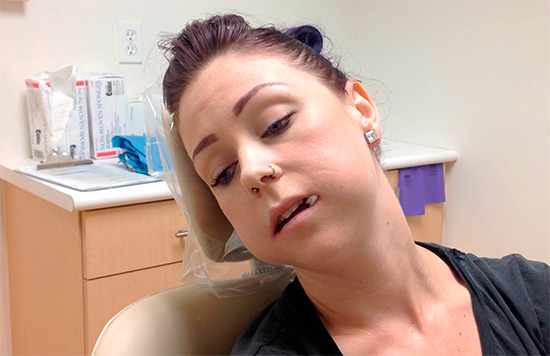
History from the practice of the dentist:
“About a year ago there was a patient with a canine root left about 12-15 years ago. Over the years, a cyst of about a centimeter in diameter has formed. In addition, a man with a canine all happened trite: she came to the lateral incisor, and there was a sharp pain in the tooth with symptoms of purulent periodontitis. I can not understand: the tooth is healthy, and you will not touch it. They took a picture - everything became clear. The lateral incisor has been removed, the man has been sent to the operating table “in pursuit” of the complicated left root, since there is about 0.5 cm of bone and gum above it ”.
Alveolitis
Alveolitis, or, otherwise, inflammation of the walls of the hole after tooth extraction, can occur for various reasons. Here are some of them:
- Traumatic surgical intervention.
- Pushing tools into the depths of the chunks of infected carious tissues of an extracted tooth or dental plaque.
- Violation of the integrity of the bone of the alveoli, leaving sharp, hurting the gums edges.
- Prolonged bleeding from the hole.
- Disintegration of a blood clot or lack thereof in the well.
- Violation of the postoperative care of the wound by the patient.
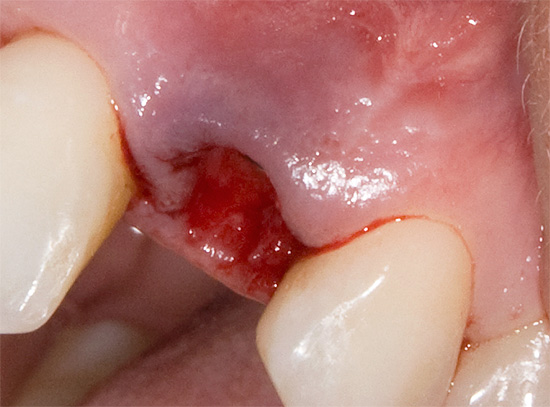
Usually, under the influence of one or several provoking factors, alveolitis develops 1-3 days after tooth extraction with a clinic of general deterioration, malaise, fever, sharp pain in the gums, a violation of chewing on the side of removal and the appearance of bad breath.
If you ignore the further development of these alarming symptoms, the alveolitis may pass into a purulent-necrotic stage with the formation of a limited osteomyelitis of the tooth hole. If the temperature a few days after the removal of the tooth rose to 39 degrees and higher, the efficiency dropped to zero, sleep was disturbed,a fetid odor emanates from the mouth, an unbearable, sharp, throbbing pain, and when removing the lower molars (including wisdom) - the mouth still doesn’t open well, then with a high degree of probability the alveolitis has already passed into osteomyelitis, and emergency dentistry is needed.
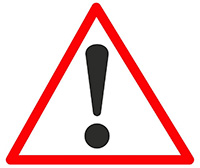
With further tightening of the process, limited osteomyelitis of the hole can turn into an abscess or phlegmon with a transition to extremely serious conditions, up to death.
Should you churn the temperature after tooth extraction and how to do it correctly
Practicing doctors agree that it is worthwhile to beat down the heat after a tooth is pulled out, because its rise causes a gradual disruption of the function of vital organs. However, what temperature should be considered the one that should be urgently lowered?
The so-called low-grade fever (37.2 - 38.0) should not be shot down, as it helps the body fight bacterial infection - this is a natural process that should not be interfered with. If the thermometer shows above 38.0 ° C, then this already indicates the need to take appropriate measures, and regardless of the reasons causing the temperature increase.
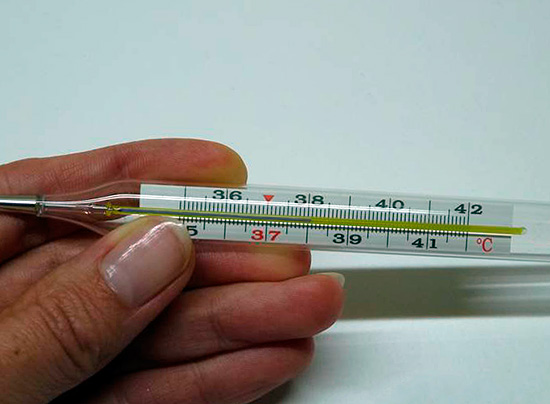
If the day before you pulled out a tooth, and the temperature rose to high values, you should take antipyretic drugs. The safest of them are drugs based on paracetamol and ibuprofen.
From the point of view of preventing risks of possible complications, the most recommended form (especially in children) is rectal antipyretic suppositories. Moreover, too high a temperature, which has risen a couple of hours after tooth extraction or several days later, is often accompanied by nausea (sometimes even vomiting), so taking syrups and tablets can be difficult.
Important!
Each antipyretic drug has many side effects, as well as certain contraindications, ignoring which can cause serious complications. That is why before using any drug drug is recommended to consult a doctor.
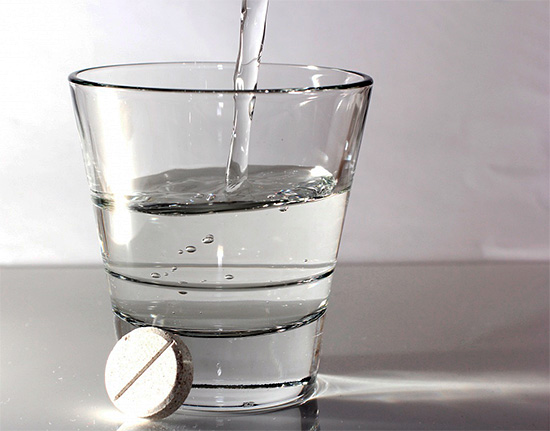
However, even if the temperature decreases after taking an antipyretic drug, if there are symptoms of inflammation (pain, swelling, breath, chewing, etc.), it is recommended to consult a dentist, as otherwise you can skip the development of a serious complication.
Help the dentist at elevated temperatures
Regardless of which tooth was removed the day before (wisdom tooth, incisor, canine), a prolonged temperature increase with alarming dynamics of accompanying symptoms (for example, swelling of the gums and cheeks increasing, pain is increasing) is a signal for an immediate visit to the doctor. When you go to the dentist, it is important to tell him in detail all the suspicious symptoms that are disturbing you now and the day before.
Any assistance begins with a survey and inspection. After an external examination, including in the oral cavity, the dentist is likely to prescribe an X-ray of the hole to make sure that parts of the extracted tooth are not left in it.
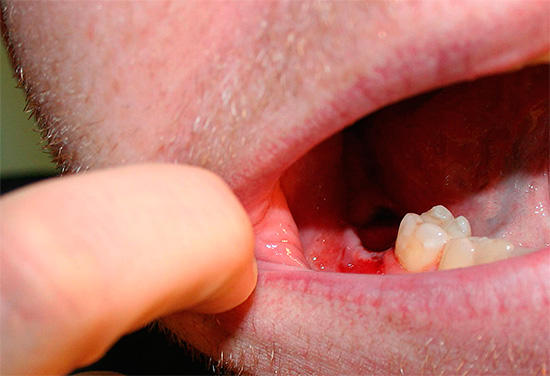
If, nevertheless, data on the presence of a root in a well are obtained, the doctor will perform anesthesia and carry out the removal of the root or its parts in a way that is available in this clinical situation. After that, the wells are washed with antiseptic solutions, a protective blood clot is formed and antibiotics and / or antibacterial drugs are prescribed along with recommendations for wound care.
If you suspect a granuloma left in the hole or a cyst, due to which the temperature has risen after the removal of the tooth, the doctor takes measures in general according to the same algorithm as in the previous case.
If this results in a rough intervention of the previous dentist (torn gums, cheek, sharp edges of the alveoli and jaw bones), the dentist-surgeon can excise heavily damaged tissues that interfere with healing, sometimes smoothing the sharp edges of the bone or biting the protruding parts with special bone clippers. After this, sutures are almost always applied, and the patient pinches a sterile gauze pad for 15–20 minutes to prevent prolonged bleeding.
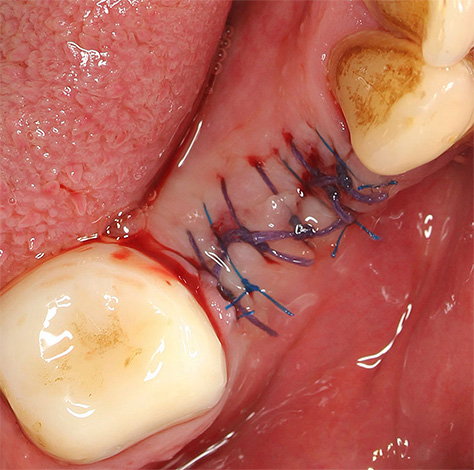
After such an additional surgical intervention, the temperature can again rise to high values, but this will be a very small price to get rid of much more serious consequences that could be threatened without medical assistance.
Be healthy!
(If you have personally experienced a rise in temperature after tooth extraction, be sure to leave your review at the bottom of this page).
Useful video about bone hole inflammation after tooth extraction (which often leads to pain and fever)
What should be done immediately after tooth extraction to prevent inflammation and other problems

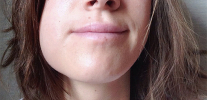
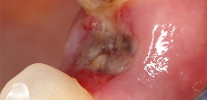
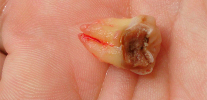
Yeah…
3 days ago, cheek swollen, when examining the oral cavity no wounds and teeth are whole. But when biting, terrible pain was noted, namely, the 6th tooth from below. I went to the dentist, did a targeted X-ray, a 4.5 cm cyst was found, with an edge lying on the nerve. Said urgent to remove, but the dentist was afraid to remove it because of the location of the nerve. Sent to the laboratory, the specialist looked and decided to make a gum incision for drainage. Then went home.After the anesthesia was over, it became insanely painful, I was numbed to tears. All swollen, even stronger. The temperature was 37.5. The next day I turned to a surgeon I knew, he did a CT scan at a time, and then he led to a tooth extraction. He removed the tooth, but the cyst did not come out, as it was large and grew to the nerve. He tried not to damage the nerve, and so the cyst was scraped, the sounds were terrible. Prescribed antibiotics. In the evening at home the temperature rose to 37.7. She was afraid that she had touched a nerve and now the sensitivity of some part would disappear. But in the morning all the fears were not confirmed. However, the temperature holds the same, but does not rise above 37.5. The jaw opens with difficulty. Tomorrow I'm going to re-inspection. Puffiness did not sleep, it is below the jaw and it hurts. But the tooth itself does not hurt.
Well, as in the end, everything went?
They removed the tooth, for a long time the blood leaked a little. I went to the doctor again, she said everything is fine, it should be so. The next day, the temperature rose 37, the blood stopped. So I think why the temperature: whether from the tooth, or the flu picked up some.
Today a wisdom tooth was pulled out, 3 stitches were put in ... I came home, and after about an hour the temperature rose. Prescribed antibiotics, being treated)
The wisdom tooth began to grow abnormally in the lower jaw, at first a little pain. Made curettage (cleaned of pus around ZM). In the morning the cheek was swollen. Made an incision with drainage. Her cheek continued to swell. Sent to the WLH. Odontogenic osteomyelitis. Removed wisdom tooth. Pierced antibiotics. After 1.5 weeks, the cheek returned to normal, but the discomfort at the removal site remained. Now, having read about this disease on the Internet, I am terribly afraid of becoming chronic. Passed after removal 2 weeks. Constantly measure the temperature. This morning, when I saw 37 on the thermometer, I almost lost consciousness from fear, I thought it was a new thing that began ... I tried again 5 times, the figures are lower. Thank God!
Two days ago, the lower wisdom tooth was removed in a free clinic. It was necessary for the child to remove a milk tooth, I think, well, and I will delete my own at the same time (he ached). If I knew what this would lead to. She was convinced that the free clinic can no longer be accessed.It is better to pay and not have problems and consequences. Not only that, after the examination, the doctor marked a completely different tooth in the map for the removal, so I still had the wall of the adjacent tooth with the tooth removed. Keeps the temperature, discomfort. Earlier a couple of years ago, in the paid clinic, the same tooth was removed, only on the left side, without problems. Now I signed up for an appointment at a paid polyclinic to fix the “shoals” of our free medicine, but for my own (not small) money. I regret that I didn’t immediately turn to the paid clinic (they are even responsible for their work there).
Those who, as luck would have it, after a paid clinic, it’s not a fact that everything will be fine. It all depends on the complexity of the structure and the characteristics of your body.
You know, I recently did in a paid clinic, unfastened 7000, and the temperature is 37.2 or 37.5, does not fall. Alveolitis began, I ride every other day, put iodine tampons. The pain is gone already for three days, and the temperature is not. And now I don’t know where to go, the lower wise is also.
I turned into a paid. There, first, the jaw was shredded and stitched together with tooth shards.When after 3 days I came there with hellish pain, I washed and stopped the wound with medicine with the help of it, and said that everything was fine .... The next day, the pain did not drown out the 5 painkillers, I immediately went to another clinic. They opened it cleaned. But the hellish pain returned - in addition, the headache already hurt ... I ran to the city polyclinic. There, the surgeon, who previously seemed dumb to me, carefully removed the last sore piece, and the hospital was given. Now the pain is coming off, and I am returning to life ... So what can you guess here.
Something you often mention the phrase “paid” - probably, you don’t want to lose clients)) Normal people (professionals) work in free clinics. The salary, of course, is lower than that of the hapun-paying people, only they treat people not because of the dough, but because this is their vocation!
I fully agree that a paid clinic is always safer. She concludes an agreement where the rights and obligations of both parties are stated. And the attitude is there as a client-patient. 3 years ago in a free clinic he treated a tooth. No attentive attitude and 2 days killed the nerve, never killed.Every move hurt me. In the end, I went to the paid and there I carefully, carefully, almost lisping, cured a tooth. I was pleased. There are a lot of good doctors in free, but they need luck! )) With love from Tatarstan 😉
Removed the 8th tooth lower, after anesthesia the pain began to tears! By evening, the temperature rose to 37.4 ... Then I don’t know what awaits me ((
Probably the same as all ...
The tooth was removed about 2 hours ago, the blood is still flowing and the temperature has risen, what should I do?
Hello! Temperature is not uncommon on the first day after removal. It is a natural consequence of injury. If its values are not critical, then there is nothing worth doing. If the general condition is unsatisfactory, then after consultation with the doctor it is possible to take antipyretic. In more serious cases, you can call an ambulance. As for bleeding: normalize the pressure, clamp a sterile gauze pad between the hole and the teeth of the opposite side for 20 minutes. If the bleeding from the hole continues, soak the middle of the tampon with a small amount of 3% hydrogen peroxide and also clamp it, but for 5-7 minutes.The main thing is the pressing force. If bleeding continues, contact your doctor who will install a hemostatic sponge in the well or direct it to an intramuscular hemostatic preparation. Try to avoid self-treatment - a dentist with related specialists will definitely solve your problem professionally. Health to you!
Removed the lower wisdom tooth, with 3 injections, for an hour I was dejected. Also sewed in the end! The next day, a little swollen, went to the reception, said that everything heals normally. But on day 3, the temperature rose to 37.2, and now the third day has not subsided. Today I am still going to them ((
And now passed? One to one situation (
And I recently cleared the dental canal (at the seven). The temperature rose to 37.5 just the next day. While I have no idea, either from cleaning, or came down with an autumn virus. By evening, the temperature had risen to 38, hit coldrex. I lie under a blanket with a chill (((
After cleaning the three dental pockets, swollen gums and a temperature of 38 are normal? They also prescribed to drink metronidazole.
Hello! Raising the temperature to high values after this manipulation is not the norm, but it can be caused by various reasons: an individual immune response, a traumatic procedure, insufficient antibacterial and anti-inflammatory therapy (in recommendations), etc. I am sure that it is worth urgently to contact your doctor for advice and treatment corrections. Thanks for the question!
5 days ago, I removed a tooth (six). Roots pounded and slightly incised gum. Baths do with the second day of sage or chamomile. Clot in place. There is no severe pain, only sometimes dull pain, as if pulsing. Edema remained small. The only thing - in the ear area is not something that burns, but warmth. The temperature has risen to 37. Is this normal?
On Monday, only the clinic will open ((What to do?
Hello! I think that the critical state at the moment is not determined from your words, but it is reasonable to visit the dentist to clarify your clinical situation and correct the recommendations. It is the dentist who determines the criticality of the state on internal admission.It is necessary to be patient and wait until Monday. If the symptoms increase, it makes sense to contact the dentist on duty immediately. Thanks for asking.
A week ago, a wisdom tooth was removed from below. There was also a cyst. Removed, cleaned. On the same evening, it began to freeze and shake badly, the temperature was 38.5. Knocked down by medicine. There was no temperature in the morning, but the jaw was very sore. I went for a checkup and was told that the wisdom tooth should also be removed from above, because it was “dead” (it was a little loose and was blue). As a result, it was removed. There was no temperature, but! A week passed, and my mouth hurts to tears, I can’t open my jaw, there are three painkillers - and it doesn’t help ((I went to clean every day, the holes are clean, and my jaw hurts to horror! Why I don’t understand. I will go to the reception again tomorrow. Tired of already living a week in hellish pain! Maybe someone had it, tell me what to do?
Hello! I think that the tactics of your doctor is not suitable in a particular situation. It is possible that it is necessary to change the doctor. Many doctors use the method of treating wells with anti-inflammatory ointment to treat alveolitis.In principle, if desired, you can choose the right home treatment after a professional (there are ointments and gels that create a good anti-bacterial and wound-healing effect). And without this, if the pain passes, it will not soon, because it is the infection that almost always provokes the problems that you have. I think that you just need to pick a doctor with a new course of therapy. Thanks for asking.
As they say - the miser pays twice. Today, in the free clinic, the eight was removed, the huge hole was not sewn up, they were allowed to go home, without even checking whether blood was bleeding or not. Antibiotics and baths are also not written. I lie with a temperature of 39, swollen. In the morning I will go to the WLH.
Hello, yesterday my wife removed 46 tooth. An hour later, the temperature rose to 38.5 and kept for a day, in the morning fell to 37.9 by dinner rose to 38.2. There was also a severe headache. Removed a tooth fee. The doctor wrote that the removal is difficult. Is it worth to visit this specialist today? Thank.
Hello! The fact is that the body's reaction to a wound (trauma) in the oral cavity is not always predictable.Most often, the rapid response of the body is characteristic when removing complex teeth in pediatric dentistry, but adults may also have such a reaction with symptoms of local inflammation. There is definitely no need to panic. Despite the fact that you did not write the appointment of your doctor, I can say that after a complex removal, antibiotics, antihistamines, antibacterial agents, wound healing and painkillers are almost always prescribed. Properly selected complex begins to work quickly enough, but sometimes a noticeable relief comes only for 2-3 days. Be that as it may, contact your doctor for correction of treatment is not superfluous. This will reduce the likelihood of complications and, possibly, will make life more comfortable after tooth extraction. Thanks for asking.
Ten days ago, the bottom eight was removed. There was no fever or tumors. But just three days ago, the gum suddenly began to ache, and the temperature rose. Up to 37.2. There is no pain now. And the temperature is there. Gums, like, not swollen, react to the sweet. Do I need to go to the doctor, bother him?
Hello! Almost sure to go to the dentist is worth it. First, the pain and temperature speak volumes: there are risks of developing alveolitis, even if not with a bright palette of usually accompanying symptoms. About the reaction to the sweet - so can the carious tooth react. And this situation involves visiting a dentist to look for a sick tooth, maybe next to a wisdom tooth removed. Thanks for asking.
I have a wisdom tooth removed, 12/15/16. 10 days after that there was a temperature up to 38.5. The doctor prescribed antibiotics, drank them for 5 days (according to the instructions), the temperature dropped to 36.3. Somewhere from 01/10/17 to the present day (01/19/17) I have a temperature of 37-37.4. My doctor is silent, does not respond to calls and messages in the Vatsap ...
Hello! I am sure that the current temperature (37-37.4) is already an indicator of the local inflammatory process. I do not think that this can be attributed to the alveolitis, but it would not hurt to check the well in order to finally make sure that the healing phase corresponds to the existing symptoms. The body protects itself as much as possible, which is why this reaction.If you doubt the treating physician, you can take a picture of the hole after removal to determine its “purity”. All the same, without examining the hole in the chair and (possibly) analyzing the image, it is not enough. The doctor is suspiciously hiding from you, and this gives reason to check comprehensively.
Hello. Very informative site. I learned more from my doctor. Thank you for your work. A tooth was removed (7 from the bottom left) on Wednesday, immediately the temperature rose a little in the evening (no problem, drank nurofen). On Friday, an unpleasant odor appeared and the submandibular lymph node greatly increased from this side. No temperature. I rinse myself with peroxide and chlorhexidine, several times a day. Do I need to worry and consult a doctor?
Hello! Thank you for your trust. You should not rinse with peroxide and chlorhexidine (this is how you harm more without getting a significant therapeutic effect). In addition, a blood clot can wash out of the hole, after which it often heals with great difficulty. If there is no positive trend in the near future (a day or two), then it is worth contacting a dentist.
Good afternoon! Removed 8 lower teeth last week on Friday, prescribed antibiotics. From Friday evening and until now (the 5th day) the temperature does not drop at all - from 37.0 to 37.5 jumps during the day. The wound itself does not hurt any more, is delayed ... How long can the temperature still hold?
Hello! This temperature is a sign of a local inflammatory process. If it jumps according to the principle: 37.0 in the morning, and 37.5 in the evening, then this state is in the normal range. It is good that there are no other unpleasant symptoms, which means that the dynamics in general are positive at the given time. The fact that antibiotics and the rest of home treatment do their good deed speaks to the prospect of improvement.
Healing takes place individually, and there is no uniform time limit for the preservation of elevated temperature. Usually it lasts no more than 5-7 days. If the temperature remains on day 7 after the tooth is removed, it is possible to turn to a dentist-surgeon to inspect the hole: if there is no pathology, you will not lose anything, and if something suspicious is found, then the doctor will stop the problem by correcting the treatment or treating the wound under local anesthesia.
Removed a tooth.After he had departed from freezing, hellish pains began. The next day he let go, but the temperature rose 37-38, at night 39. I had to call an ambulance - the paramedic said nothing. A day later I was holding 37.5, in the evening I started to rise, then fell, but I took 1 amoxicillin tablet. So, now I don’t know whether to go to dentistry or not?
Hello! An increase in temperature in the first days after removal is a normal reaction of the body. Often, the temperature rises in the evening, and in the morning - within 37.0-37.5, which corresponds to the inflammatory reaction on the background of injury. You should contact your dentist in case of serious conditions against a background of elevated temperature: severe pain, swelling, impaired mouth opening, putrid breath, etc. If the temperature above 37.5 lasts more than 2 days - also to the doctor. Thanks for asking.
14 number removed the top eight. For a long time the blood did not stop, for 2.5 hours. Then, like, nothing, everything calmed down. The next day, my cheek was slightly swollen, and there was a swollen couple of days. Examining the hole, everything seemed to be fine, the clot was in place.A 19 number ached neighboring upper teeth. And not a particular one, but all together, and the temperature is 37-37.2. Today is the 20th number, and the aching pain persists, but it is absolutely tolerant. The temperature is the same - 37-37.2. Edema no. And the hole itself does not hurt. And today I began to look, and I did not see a bunch. What is there in the depths, I do not see. After the removal, I asked the doctor what I should pay attention to, what to fear, and the doctor answered me: “Forget about the tooth!” I didn’t rinse anything, I didn’t eat anything on this side, but on the 4th day I drank hot tea. Should I see a doctor, or while I wait and watch?
Hello! I think that the period of possible development of alveolitis has already passed. It may well be a safe healing of the hole and without a blood clot, when it is partially washed out of it. I think that now you should be guided by logic and common sense, but it’s better to see the doctor once for your peace of mind (than to think anxiously for a week then, does everything heal normally there ...)
Hello. They removed the top seven, the temperature rose. It could, of course, be a virus. But I apparently struck the maxillary sinus. Smell awful in a nose, I wash out, I stamp. Now appeared a little bloody clots. The tooth was with a cyst.Maybe this is it coming out? Help.
Hello! I think that we are talking about infection of the maxillary sinus due to the close proximity of the apex of the root of the removed seventh tooth to its wall. To find out, consultation with the ENT physician with close interaction with the maxillofacial surgeon is required. Let the ENT doctor first give a conclusion: if he excludes a pathology for his part, then you can search for the cause of the problem already at the dentist.
On Monday I came to the doctor with a flux. Removed the penultimate tooth, near the wisdom tooth. All is well, but I am worried about the constant temperature. It is not higher than 37.5. Today is Wednesday. How long will the temperature last?
There was also a cyst. Prescribed antibiotics.
Hello! If there are no other symptoms, then do not worry. Usually this temperature is present for no more than 3-5 days, depending on the reactivity of the immune system. Just the same, the doctor prescribed an antibiotic to reinforce the elimination of the cause of the problem (sore tooth) also with a sufficient antibacterial effect.So be patient and be healthy!
Hello! My son had a tooth removed today (74). Diagnosis: exacerbation of chronic periodontitis. Removal was simple. Desna blood, pus, I did not see there. Heat appeared 2 days before removal. The doctor prescribed an antibiotic that is drunk for 3 days. How long will his temperature last?
Hello! It depends on the temperature: it can be high (above 38.5) during the first two days after removal, with the uptrend usually in the evening and in the morning from 37.0-37.5. Temperatures of up to 37.5 may be after removal, normally not more than 3-4 days. If the temperature takes place to be more than 4 days and there is a tendency to increase closer to the first half of the day, then an urgent need to see a dentist. The same applies to high temperatures, as well as other alarming symptoms that may threaten the health of the child (swelling, severe pain, dirty-gray bloom in the hole, putrid breath from the mouth, etc.).
Hello, yesterday removed the top 7-ku, the anesthesia did not work, there was a cyst. Home came with a temperature of almost 40. Today, the temperature still rises to 38.The hole does not hurt, no edema. Antibiotics are not prescribed. I do not know what to do, wait until it passes? Or nevertheless to the doctor?
Hello! It is best to consult a doctor, as with these symptoms you may need to take antibiotics and use anti-inflammatory drugs. If the temperature is high in the morning, then this is especially bad. An increase in temperature may be associated with an active infectious process that is urgently worth stopping. Tooth extraction does not always allow the immediate elimination of a bacterial infection. Once again I advise you to visit a doctor!
Hello! Yesterday the remnants of the bottom 8 were removed, with 3 shots - and that is painful. Swollen cheek. In the morning, everything became more or less, all day feeling like I want to get sick, but the temperature is low, 36.1-36.3. By the evening my mother swelled up don't worry ((She drank nimesil, saved a little. After removing a drug, they said that she would come out, don’t touch it. Maybe it was him? And what should I do?
Hello! From the "drug", which was put in the hole, it could hardly be like that.Usually in the first days after the removal of a tooth just in the evening, the condition may worsen, especially since this is the removal of the lower wisdom tooth. I do not think that it is worth touching the drug, but it is worth consulting with your doctor to inspect the well and (maybe) correct the treatment. I am almost sure that there is nothing terrible, but at least the doctor will also be calm that your healing is taking place in a normal manner. Follow the recommendations that your dentist has appointed to you, and also get a consultation from him (just in case).
Yesterday the lower 5 tooth was removed, in the evening the pressure jumped to 150, the gum ached. Today my cheek has swollen, the temperature has risen to 38. I went to the clinic. Surgeon (doctor of the highest category) Ismagilov said: go to the therapist, the case is not ours, after the extraction of the tooth there cannot be such a temperature. I asked at least something after the removal of the tooth, and he: I told you, not our case. I went to the pharmacy and asked how you can soothe the gums, advised nalgesine. At home I took a pill - after 5 hours the temperature is 37. The question is, why these doctors? I read the article - it became clear why the temperature and swelling.Doctors need, probably, to read the Internet too. Thank you for the article!
Hello! It’s good that everything ended well. Thank you. High temperature on the background of injury after tooth extraction, of course, may well appear. And increased pressure and against the background of even moral experiences alone often arise. Good luck to you!
Hello! A flux formed during the day, the next day at 11 o'clock I went to the dentist, he removed a tooth (or rather, what was left of it - 3 roots), said that the pus had gone, so the gum incision would not be done. All day and all night thereafter, the blood did not stop, the temperature rose to 38. I drink antibiotic amoxicillin. Perhaps such that pus does not come out, and the incision still needed to be done?
Hello! About the need for cuts - this is a purely individual question. In general, according to the protocol, incisions with periostitis (“flux”) are mandatory, especially in the lower jaw. When removing the upper teeth with "flux", many dentists-surgeons do not accompany the procedure with cuts.Just for most patients, even the word “cut” alone brings a lot of negative impressions. Who wants in addition to the removal of the tooth still get the impression of the scalpel. Therefore, surgeons, seeing that the removal of the upper teeth can not be accompanied by a cut and everything goes well, do not make it. Since you have a three-root tooth, I suspect that you have just the top 6 or 7 removed.
The fact that you had long-term bleeding is not very good, but if everything is tolerable on the second day, then you should not worry. As for temperature 38: this is a common reaction against the background of tooth extraction with purulent infection. Everything does not pass quickly, as many think, especially in such cases.
Regarding the last question (that the pus does not come out): yes, it is possible, but it happens very rarely. I think that it is worth visiting a dentist to determine the quality of healing of the hole. Usually, after such deletions, control examinations are appointed: every other day, at 3, at 7.
The tooth was removed, the hole was bleeding for a long time. The next day, the blood stopped. Everything is nothing, but on the second day the cheek swelled up, did not measure the temperature. On the third day I measured it - 37.Teeth ache and pulsate near the pulled tooth. This is normal? What do you advise?
Hello! I would advise you to contact your dentist to control the situation. The fact is that 3-4 days after tooth extraction, the risk of developing alveolitis is high, and you have symptoms that give you the right to think about the beginning of this process. It is clear that edema, temperature and even pain can be a condition within the normal range, but taking into account the symptoms it does not hurt to protect yourself from possible complications. After checking you can no longer worry and continue to follow the recommendations of the attending physician.
Good day. Yesterday they removed the bottom "6", because it turns out that the tip of the “needle” stuck in the root canal (after treatment 4 years ago) and the channel was not completely sealed. Inflammation formed under the root, which began to go to the next root of the tooth. The doctor said that the operation can be done to remove the root site, but there is no guarantee that the inflammation could be cured because it started to go to the next root, therefore removal is the best option.As a result, they removed it, everything is fine, they sewed up the hole, but yesterday and this morning the temperature was 37.5, and tonight it was 38.5. Periodic dull pain in the gums and pain and discomfort when you press the next "5". Is this the norm? Should I panic at this temperature?
Hello! You should not panic: the first two days (especially) the tendency to rise in temperature is often observed as a result of inflammation in the background of injury - usually a slight increase in the morning, and closer to 39 in the evening. Sometimes the temperature is on the third day after removal, especially if the body is weakened.
Despite the fact that the symptoms described by you fit into a normal reaction in half of the patients after tooth extraction, it is highly recommended to contact the attending physician for a routine inspection of the hole 3-4 days after the procedure, since it is during this period that the purulent inflammatory process can join. , and the result will be alveolitis - inflammation of the hole with characteristic signs.
After tooth extraction in almost all patients, the teeth adjacent to the hole react when pressed forseveral days in varying degrees. So in this regard, do not worry.
Hello) I have removed the top seven yesterday, my temperature jumps from 37.0 to 38.5 and my jaw hurts when I bite. Should I go for a re-inspection? Said nothing to rinse.
Hello! In the first days after tooth extraction, there is usually a tendency for the temperature to rise in the late afternoon. If the temperature is low (usually the ambulance is called at values from 39.0 for an adult), then you should not worry. However, it is advisable to undergo a follow-up examination at the doctor for 3-4 days after removal, to eliminate the risk of additional problems due to alveolitis. When biting on the adjacent teeth, pain is possible up to 3-5 days after removal, sometimes up to 7 days. This is the norm, since there is a wound next to innocent teeth, and there is a definite connection with the periapical tissues of the roots of the adjacent teeth.
As for rinsing - indeed, it is usually not recommended to rinse with anything, this is the opinion of many dentists.
Thank! Thanks to your comments, I calmed down to find out that the increased temperature and bleeding of the gums after the extraction of the tooth is normal and there is no reason to immediately get upset! And then I started to bury myself, I thought that the surgeon had infected me with some infection.
Hello! I did not find such questions above, so ... I removed the upper wisdom tooth in one place, but since the prices are unreal, the lower wisdom tooth decided to remove it in another. After removing the lower wisdom tooth, the second day is fever, nausea, pain in the lower jaw and weakness. In the first clinic, the anesthetic differed from the anesthetic in the second. In the first case, I did not feel it at all, in the second, the numbness of the entire half of the face, throat. I think it was somehow outdated. My question is, can these side effects be associated with such an anesthetic, or is it because the lower jaw is always harder to give? What do you think about that? Why use outdated anesthetics? And question number 2: the wounds were not sutured, in what cases did the edges of the wound sew, and in which not?
Hello! Side effects from anesthetics rarely concern facial numbness, most often anesthesia can affect the general well-being within 1-2 days (nausea, headache, drowsiness, bleeding from the well, etc.), up to allergic reactions. It is much more likely that the effect of “anesthesia” of the half of the face and throat is associated with the invasiveness of work on the lower jaw, where the mandibular canal with the nerve passes closely, which can be compressed by hematoma. Much less often during removal, a mechanical nerve injury occurs with medical instruments.
The lower jaw is almost always more problematic in many respects than the upper jaw - this is what you correctly noticed.
Obsolete anesthetics are used for various reasons, most often: 1. State Dentistry and does not have the ability to supply doctors with other drugs; 2. Or the dentist himself for several reasons does not have the skills to work with imported drugs.
As for wound closure: after a complicated tooth extraction, it is really recommended to take a wound for comfortable and fast healing. Although here doctors may have different opinions.
I recommend to contact a good dentist to monitor the hole.
Good day! A week ago, removed the bottom 8-ku. Swollen cheek, there was no pain. At the doctor's prescription, nimesil saw 2 times a day. On the third day, the edema slept, but in the cheek along the bone there was a hard edema (4 cm in size), as if a stone had been sewn into the cheek. Began to whine (tolerant) teeth, temperature 37.2. Today is a week. I visited the doctor a couple of days ago, the doctor examined the hole and said that everything was fine (no inflammation), just a hard hematoma. But why then the temperature and pain? Thanks for the answer.
Hello! Apparently, the extraction of the tooth turned out to be somewhat traumatic, and therefore the process of restoring the tissue around the hole takes such a long time. I do not think that this is an alveolitis.
And about the "hard hematoma" - a moot point. It is possible that there are protruding edges of the alveoli under the gum, creating the effect that "the stone was sewn into the cheek." Temperature 37.2 is associated with a local inflammatory process. In principle, this can be considered a condition in the normal range, even within 7 days after the removal of a wisdom tooth. About the fact that “teeth began to whine” - I suppose it is a question of irradiating pain from the same wound.She, of course, hurts in the first days, and then reacts only after her irritation (with food, solid objects, drinks, etc.). Such pains can last up to 2 weeks, depending on the degree of "openness" of the hole, the presence or absence of a blood clot, and the possible addition of infection. But almost certain that you do not have alveolitis, you should not worry; when deterioration of the condition - consult a doctor.
Good day. 6 days ago removed the lower wisdom tooth. There was a little cheek swelling. The pain is average, drank nimesil. There was no temperature. For the sixth day, the edema is gone, every day I drink 100 mg of Nimesil. The pain is tolerable, but there was discomfort. Yesterday there was a temperature of 37.1. In the morning it was normal, and now again 37.1. The gums are not swollen. The hole is also normal ... Sound the alarm?
Hello! I think that the alarm should not be sounded. The fact is that there is a clear tendency to improvement, the disappearance of symptoms (reduction of swelling, pain, etc.). Temperature 37.1 indicates the presence of a local inflammatory process on the background of the healing of the hole, and in the late afternoon the temperature may increase slightly.Usually, this symptom disappears completely as the well heals (within 1–2 weeks).
If the state of health does not deteriorate, then do not worry - have patience and follow the recommendations of your doctor.
Three days ago, he pulled out a wisdom tooth, which rested on another tooth. Therefore, first incised the gums, and then tore. And now the third day the temperature is 38.7 (maximum): in the morning it drops to 37.5, and in the evening it rises again. And so, it can be said, the whole day rises, then falls. The first two days of wild pain in the gums and swelling of the gums, and lymph nodes were inflamed and there was a wild weakness and fatigue. On the third day, the edema was asleep, the pain was gone and there was no tiredness, but sometimes the lymph nodes bother ... The doctor says that the wound heals well. I drink antibiotics and anti-inflammatory. I wait, when I can sleep normally, but not sweat and eat))
On Friday evening, a tooth ached. Tolerated until Monday, how could anesthesia. By Monday, the tumor has grown to the larynx. The temperature has risen to 38.5. I went to the dentist, I wanted to make a puncture for the pus to come out. It did not work, because I could not remove the crown.He removed the tooth, the tumor began to subside in the evening, and has now reached the chest. The temperature holds 37.2. Tell me how scary is it?
Hello! In such severe cases, you should not rely on chance, but requires constant monitoring by the attending physician to prevent life-threatening complications (you describe some rather alarming symptoms). I recommend that you regularly visit a doctor to control the situation - sometimes in such clinical cases it comes to treatment in a hospital. Health to you!
Good day! Removed the bottom 8-ku (07/09/2017). The tooth was in a horizontal position, and deep. The ice put a little, and slept a couple of times at night on a sick cheek. Began to swell cheek. On the 3rd day, the temperature rose to 38.7. Sbili. During the whole 3 days there was a temperature of 38.4, etc. Sbili. Today (on day 4) the cheek is still big, and it has become hard, as if it was a stone. The edema goes around the neck, everything is red and terribly painful to touch - a sharp pain. There was no temperature. In the evening, again under 38.0.
Did after removal: antibiotic augmentin - 5 d (a day before the operation began to drink). The doctor extended up to 7 days, but did not call for an appointment. Rinsing with chlorhexidine - on the 2nd day of surgery.She smeared metrogylum along the suture line - for 3 days (although the doctor said for 2 days), but I could not stick my finger. To eliminate the effects on the antibiotic I drink lacto.
Is the body's normal behavior? The hole does not hurt, it hurts the swollen cheek, it is very painful to talk and eat. I can hardly eat on the right side, it is a bit painful to swallow. Edema becomes burgundy. It does not grow, but I will not say that it falls down.
Hello, Sasha! The symptoms described by you are rather alarming and can speak of the development of diffuse suppurative inflammation (phlegmon):
1. High temperature;
2. Cheek edema (“hard as a stone”);
3. The edema is released to the neck, there is a pronounced hyperemia of the skin (you indicate a burgundy color);
4. Pain when swallowing and talking;
5. Limited mouth opening.
All of these signs indicate the presence of a very serious disease (phlegmon of the submandibular, winged, and pharyngeal space). In such a situation, I would recommend immediately call an ambulance and go to hospital for maxillofacial surgery for hospitalization.
They removed the lower “recumbent” figure eight, but since the tip was finely destroyed (the tooth did not hurt), we managed to do without sawing the jaw, although we were busy for a long time. Imposed 4 sutures, washed with chlorhexidine, put the medicine on the basis of iodine. After the anesthesia was gone, I started to shiver, drank, as the doctor recommended, ibuprofen. They decided to do without antibiotics for the time being, to watch, because I have a baby-infant.
On the second day in the morning, as soon as the antipyretic effect ended, the temperature jumped high again, up to 39.5 at one moment, and within a few hours it dropped to 37. The cheek was swollen, the seam was not sick. The mouth opened with effort. On the third day, the temperature was 37.1-37.4, on the fourth, 37.1 the whole day, and the suture was examined by a surgeon. I found that the seam is well-grounded, there is no inflammation, I recommended to develop the cheek muscle so that there are no contractures.
On the fifth day, for some reason, the temperature is 37.5. Nothing hurts, the seam looks the same, the swelling is reduced, the mouth opens all the better. But the temperature, albeit small, does not settle down.
I rinse my mouth after a meal with an antiseptic (a few drops of alcohol marigold or propolis in a glass of warm water), but only from food debris,very carefully, so as not to blur there is nothing in the hole. I absorb lozenges with sage.
While waiting, watching.
Should I clean the wound with Miramistin after removing the lower 8 for 3 days?
Hello, Denis. Miramistin is a good antiseptic, which is sometimes prescribed after tooth extraction. However, you should not rinse, and do mouth baths, so as not to destroy the blood clot in the hole.
Hello! On Friday removed the bottom eight. The doctor prescribed antihistamines, an antibiotic and ibuprofen for 7 days. The first 3 days there was no temperature, on the fourth day the temperature rose: 37.1-37.3, and the gum does not subside.
Today is the seventh day after removal. The doctor said that the food is clogged (although there is no pus) and that it is necessary to rinse. With temperature how to be? Is it normal that does not subside?
Hello! This temperature is a consequence of local inflammation in the background of injury. This is a common occurrence after a tooth extraction operation, but there are exceptions (for example, when the heat is kept for several days in a row).As for aching pain, this is also a condition within the normal range if there are no other disturbing symptoms (severe swelling, high fever, pain that cannot be relieved by analgesics, putrid breath from the mouth, etc.).
About the fact that the food is clogged in the hole - when the hole does not have a blood clot, it really becomes a kind of "trash can" for food debris from the mouth. It will heal with difficulty. Sometimes it is advisable to form a new blood clot with anesthesia, but you can simply adjust the recommendations, appointing a rinse decoction of herbs or other non-irritating drugs. These issues are worth discussing with your doctor.
Hello! 9 days ago, the lower 6 was removed. For three days, the jaw and head hurt badly. Saw painkillers at night ... Then, it seems, it became tolerable. On day 6, my teeth started to hurt nearby, a chill appeared and the temperature was 37.2, pus was draining away. I was at the reception on the 7th day - they said that everything was fine, there was no redness. I drink antibiotic and rinse with salt + iodine drip said. But the temperature does not pass. Do I need to clean the hole?
Hello! In the situation described by you, it is worth taking a snapshot of the problem area: there is a suspicion of the presence of roots or parts of the crown part of the tooth left in the hole. It would be nice to check the condition of the roots and channels of the tooth adjacent to the hole, since there may be a hidden inflammatory process against the background of carious destruction. In any case, suppuration for 6-7 days after tooth extraction is not normal.
The fact that you comply with the recommendations of the doctor is great. After a detailed diagnosis and the establishment of the true cause of the increase in temperature and suppuration, it will be possible to say whether it is worth curettage the wells or not. Most often, cleaning is required in such cases, as you describe. Therefore, be sure to consult your dentist to clarify the situation.
Hello. They removed the bottom eight in the CHLH hospital, the tooth was in the bone, and under the 7th tooth they were sawed out. I am in the hospital for 6 days, they inject antibiotics 3 times a day. The temperature from lunch every day 37.0, rises in the evening to 37.4. Mouth open barely, numb lower part of the jaw, tongue. When talking, there is a feeling that the jaw goes sideways.Now it feels like nose swelling. The doctor says that these are the consequences of the operation and everything will pass. But already 6 days in the hospital, but there are no changes, and there is pain in the temple. Maybe someone faced this problem?
Hello! Given the complexity of the operation and its trauma (judging by the description), the symptoms that you have are quite natural. Stabilization often occurs only a couple of weeks after the intervention.
Numbness is likely to be associated with a hematoma in the mandibular nerve, which is compressed by it. This occurs as the hematoma is resorbed, most often in the first month after tooth extraction. Your temperature is within the normal range for such a post-traumatic situation. Edema after complex deletions is almost all. Violation of the opening of the mouth - also often occurs after the removal of the eighth teeth. Ideally, the doctor should select a set of exercises for you to improve the opening of the mouth.
As for the pain in the temple - the nature of pain after a complex removal of wisdom teeth is largely individual. Someone can hurt the whole side of the face, head, tonsils, ear, throat.So you need to be patient, follow the recommendations of the doctor, and the unpleasant consequences will gradually pass.
Ripped off the remnants of a wisdom tooth, also a temperature of 37.6. I think this is a defensive reaction of the body, must pass!
In March 2016, he treated caries (in normal paid dentistry) and the dentist offered to take a panoramic picture and look at the state of wisdom teeth. It turned out that the bottom left eight is growing in the seventh tooth - respectively, the eight to be removed (I completely agree). BUT, I was greatly frightened by the difficulty of removal: "We need a whole mini-operation and an experienced surgeon, in our clinic there is no such thing, if you want, I have a good professor in the department, he will do." I said good. And I forgot with joy about this tooth for almost 2 years.
December 28, 2017 this tooth reminded of itself, I did not attach importance to pain and thought that everything would pass by itself, but did not pass. On January 1, he wrote to the “old-timed” dentist asking him to coordinate the operation with the professor and the cost. It turned out that the professor can only after the holidays, since the institute does not work and it will be released in a tidy sum.There was no time to wait, I went over a ton of information a day, according to reviews I found a classroom maxillofacial surgeon. On January 3, 2018, I was already at his appointment - it turns out that I have periodontitis or periostitis. In general, something of this. He ordered me to drink antibiotic Tsiprolet A, 7 days, 3 tablets per day. Then either remove it, or first remove the “hood” and still take a new panoramic picture before the visit.
January 9, I take a picture, the picture is the same as two years earlier. On January 10 a friend calls and offers his class specialist and the price is much less, I was interested. January 11, I am at the reception, I sent a snapshot yesterday. They removed the tooth without cutting it with a drill, by loosening (I thought I would break my jaw, sometimes holding it with my hand). Sewn up everything as it should be, I was not given any recommendations for care, although I asked
It took 36 hours from the moment of removal, such symptoms: 1) severe difficulty opening the mouth, 2) severe pain when swallowing on the side of the jaw where the tooth was removed, 3) temperature 37.5, 4) cheek swollen. In the morning I will call the dentist who removed the tooth.
Question. Do I need to take antibiotics and worry about the manifestation of these symptoms?
Hello! Symptoms are fully justified in terms of complexity of manipulation and its trauma. However, a possible negative trend in this case is better confirmed or denied by the attending physician or other dentist. I mean the fact that the symptoms that you described may indicate both the approaching complication, and simply can only characterize a large injury in the oral cavity, in which there is just difficulty in opening the mouth, and fever, and swelling. Regarding antibiotics: they are indicated for large surgeries, but the doctor himself determines the tactics of treatment in each particular case. If there really was periostitis, antibiotics are 100% needed. But again, it is better not to prescribe any drugs yourself, consult specialists.
Hello. Four days ago, I removed the top 6, the hole was bleeding for about 1 day. Then every day it got better and better (the pain passed). But this morning I discovered that the hole had started to bleed very badly again, the temperature had risen (37.1), the hole had begun to ache, and my head ached on the side of the torn out tooth. I can only go to the dentist on Monday.Should I contact the emergency dentist on an urgent basis?
Hello! By all indications, you have developed alveolitis (inflammation of the hole). This process, as a rule, is accompanied by a strong pain syndrome, unpleasant smell from a tooth hole and sometimes an increase in body temperature. Alveolitis can also trigger late bleeding from the hole. Because do not waste time and consult a doctor urgently. The sooner the doctor starts the treatment of alveolitis, the less pain will have to suffer and the shorter the treatment will be.
Hello. I have bad teeth since childhood. This is inherited in our family, and I have four children. Teeth always treated. Many people remember that earlier in the school, according to the magazine, they called for a dentist, I never refused. After the last pregnancy, the teeth began to break, there were some ulcers on the gums, granulomas on the lower incisors. In general, a disaster. I start the preparation and prosthetics for the third time, I hope I’ll go to the end. For all my life I have already removed 13 teeth. Ten days ago, a complicated lower seven was removed (1 hour 20 minutes). With crushing, X-ray and suturing.And three days ago - the top seven with three long roots. Now I do not understand what bothers more. On the lower jaw pulls and hurts. After removing the upper one, I couldn’t press the bandage tightly, the bottom was aching, an hour and a half later I started to shiver, and then I was beating for an hour so that I could not control it. The body shudders, jaw walks with a jog, jaws loudly pounded, afraid to bite the tongue. The temperature rose to 39, after two hours the temperature subsided.
Today I woke up with a slightly swollen cheek, the temperature at 37 is holding. The husband says the smell is unpleasant. The adjacent tooth exactly has suppuration on the gum. Torment questions. What was that all about? So the local anesthesia was moving away, or was it already necessary to sound the alarm? Maybe it touched the abscess and went infection? How often can I remove teeth and how many at once? I still have a lot to remove, but once a week anesthesia, and then antibiotics and pain medication ... I want beautiful, albeit false jaws, but I'm afraid not to endure complications. And I am only 34 years old, and soon to go to work to leave a child care leave.
Hello Yulia! After a complex tooth extraction, there is always swelling and pain. You write that you were shivering and “beating” - a local anesthetic is not the cause of such symptoms.So the body is trying to raise the temperature of the body in order to more effectively fight the infection (you should also take into account the stress you have suffered).
In general, swelling of the cheeks, increased body temperature (even 37), soreness, bad breath suggest the presence of an inflammatory process. I recommend to contact a dentist-surgeon for an examination and to clarify further treatment.
I note that in situations like yours, to solve a problem with teeth, it is sometimes recommended to carry out a radical treatment - removing the remaining teeth under sedation with simultaneous implantation and prosthetics on them for a short period of time (literally 3 days). In a number of clinical cases (not all), this is the only right decision, which relieves the patient from numerous visits to the dentist, helping to restore aesthetics, correct bite and chewing function.
Hello! Yesterday removed the lower wisdom tooth. After 3 hours, the temperature rose to 38.2. I hit her. And now this morning it has risen to 38, also hit. Nothing hurts, not swollen. Should I panic and go to the dentist? How much temperature can hold?
Hello Anna. The temperature does often rise after the removal of a tooth and is one of the signs of inflammation (it can last from a couple of days to a week or more). Inflammation does not always go away on its own, but in your case, the temperature in the morning is additionally alarming (usually it rises in the evening). You should not panic, but I recommend that you register for an examination with your doctor so that you will be given an appointment.
On June 14th, a wisdom tooth was removed in the lower jaw. Removal was accompanied by a gum incision and suturing. June 16 was at the dentist, said that everything is fine. But I have swelling, the temperature is kept at 37.3. With pain, I can open my mouth to bite a banana, swallowing food is accompanied by pain, as with sore throat, and there is aching pain (either in the place of the former tooth, or in the neighboring tooth, I cannot say for sure). Tell me, are these phenomena normal on day 2 after surgery, or do you need to sound the alarm? Thanks in advance for the answer!
Hello Daria. If the operation of the tooth extraction was difficult and lasted for a long time, then it is often accompanied by a significant injury (often with these operations, the mucous is cut and the bone is cut out).In this case, the soft tissues next to the tooth react sharply to such an intervention, which can provoke severe swelling, fever, painful swallowing, as well as difficulty opening the mouth. These phenomena are normal on the 2nd day after tooth extraction, but here it is important to monitor the dynamics - with each day it should become better. If positive dynamics is not observed - it should be, without delaying, to go to the doctor for a checkup.
Hello. It was difficult for me to get a wisdom tooth (eight), it was painful. I went to the dentist - made a gum incision. The pain did not pass. I went again, and again another incision was made on the same wound ... Already 5 days the temperature lasts 37.3, weakness, gum hurts. Is this how it should be? The temperature does not fall. I am worrying a lot.
Hello. This is possible, in these cases usually take painkillers from the group of NSAIDs (after eating). If the pain and temperature do not pass within the next 2-3 days, and the dynamics are not positive, then it is necessary, without undue delay, to come to the doctor again and examine the condition of the tooth.In general, I can say that in such situations there is a risk of serious complications, as a result of which many doctors prefer to remove such problematic wisdom teeth as soon as possible. So carefully monitor the state of health, and if you deteriorate, hurry to the doctor.
Hello. I had a bad toothache. In the morning I got up, looked at my face - a lump appeared. Then the dentist removed the tooth. Already passed 3 days after that. I have a temperature of 37.4. What should I do?
Hello, Aigul. 3 days is enough time for the condition to return to normal. Since this did not happen, I do not recommend waiting any longer, it is better to go to a doctor right now - sometimes in such cases antibiotic therapy is started, which includes an antibiotic, probiotic, antihistamine, NSAIDs. The feasibility of such treatment can only be assessed by the doctor during the examination, so hurry to the doctor.